Kicking off the first full installment of my ‘Meet the Author’ series is the subject of movies. Movies are a great jumping off point, because of how universal they are, forming a shared cultural consciousness. With media delivery broadening and alternative entertainment becoming ever more popular, it’s no longer the case that people will all see the same movies, but it’s still a huge part of our social lives across the world. Movies are very relatable from person to person, as well as to other forms of media. Books get turned into movies. Movies get turned into books. Hell, Disney rides get turned into movies!
I think that my writing has always looked to movies for inspiration, drawing on imagery, dialogue, and motifs. I’ve had more than one person read my book and say that it would make a great movie, which I think is a great compliment. It means that they could share what I was seeing in my head, and that’s a powerful connection. Before starting down the path of being a novelist, I actually wanted to be involved in cinema. I was involved in the technical side in high school, and went on to do my own video editing projects in college and beyond. Until my first novel, the longest thing I ever wrote was a screenplay that I ultimately left for dead. It’s still something I’d like to circle back around to, especially given how much more writing experience I now have.
The cinema connects people, and I hope by sharing my thoughts on movies that I can build a greater connection with my readership. A fallback question when getting to know someone is always “What’s your favorite movie?” I see no reason to not answer that same question. Getting to the meet of the article then, are the Top 5 Movies of A.C. Harrison.
I think that my writing has always looked to movies for inspiration, drawing on imagery, dialogue, and motifs. I’ve had more than one person read my book and say that it would make a great movie, which I think is a great compliment. It means that they could share what I was seeing in my head, and that’s a powerful connection. Before starting down the path of being a novelist, I actually wanted to be involved in cinema. I was involved in the technical side in high school, and went on to do my own video editing projects in college and beyond. Until my first novel, the longest thing I ever wrote was a screenplay that I ultimately left for dead. It’s still something I’d like to circle back around to, especially given how much more writing experience I now have.
The cinema connects people, and I hope by sharing my thoughts on movies that I can build a greater connection with my readership. A fallback question when getting to know someone is always “What’s your favorite movie?” I see no reason to not answer that same question. Getting to the meet of the article then, are the Top 5 Movies of A.C. Harrison.
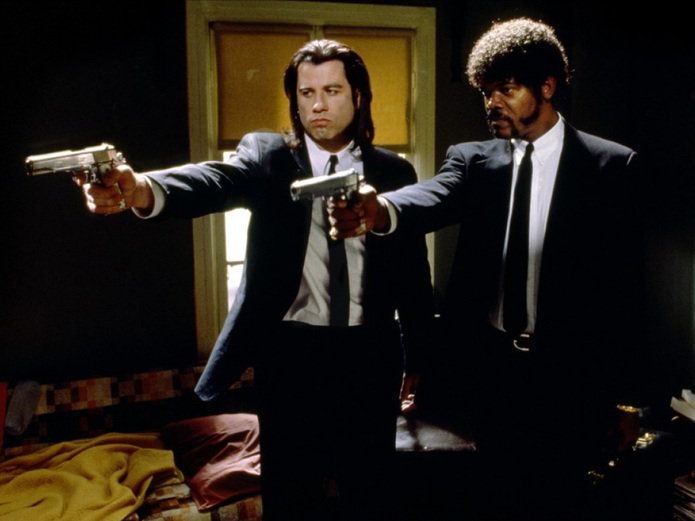
5. Pulp Fiction – Picking five movies is extremely difficult. Picking who catches that coveted last spot on the list is near impossible. If anything, I would say choices 1 through 3 are fairly static, but 4 and 5 can change hourly. That said, I had to give a nod to one of the most creative and revered directors of our lifetime: Quentin Tarantino. And while all of his movies are solid, each one bringing its own new taste to Hollywood, it’s Pulp Fiction that defines both Tarantino as a director and the reasons why we love him. From the disjointed storytelling to the whip-smart dialogue, there isn’t a single aspect of the movie that doesn’t ooze slick style. It says something that you can walk into any social gathering and ask what the French call a Quarter Pounder with Cheese in Paris and instantly have someone retort that it’s a Royale with Cheese. And check out the brain on Brett! For any writer who wants to learn the subtle mastery of character banter, this is the film to watch. Again and again, it brings new surprises and delights with each viewing.
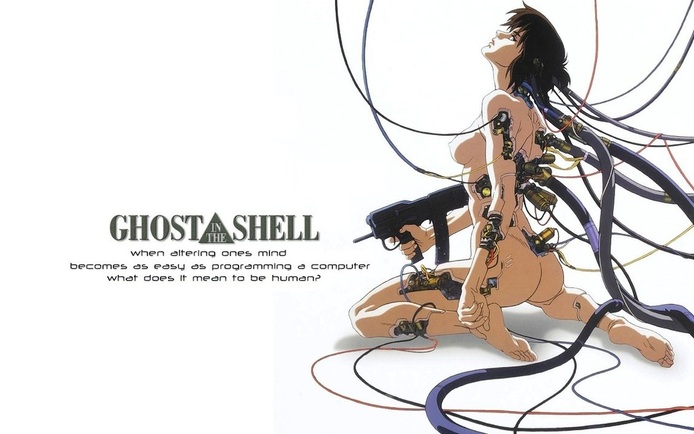
4. Ghost in the Shell – Yes, anime, I know. This anime, however, is exactly what people need to be shown if they think that what comes out Japan are ‘just cartoons’. While the sequels and TV series were good, the original film shows exactly what cyberpunk is about, capturing not just the visual darkness, but the uneasiness and brooding that rains down on a world simply awash in technology, where people’s brains can be hacked, and where cyborgs question whether they are still human or just programmed to think so. I fully confess, this spot nearly went to Akira, but while Akira also subscribes to the cyberpunk ethos (including being confusing as hell), it lacks the metaphysical and philosophical aspects that make GitS a towering pinnacle of achievement in animated storytelling. If we’re lucky, Hollywood will leave this one be and not poke it with the stick of ruination (reference The 47 Ronin).
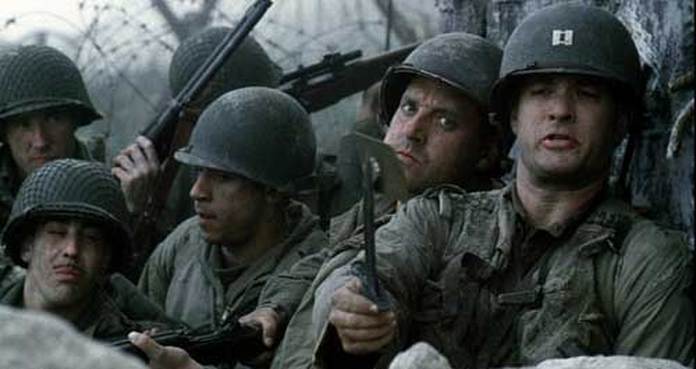
3. Saving Private Ryan – They say that the men and women who fought in WWII were the greatest generation. In my humble opinion, this is the greatest film of that conflict. The cinematography is a towering achievement, with the landing at Normandy obviously receiving top billing. Not many people know this but Spielberg chose to reduce the color saturation of the film by 60%, giving the movie an aged and cold look that places you in the period. Though WWII did not happen in black and white, we best remember it that way, and Spielberg made the right choice to film it as close to that way as possible. It’s easy enough to say that the story is captivating, that the acting is spot on, and that the battle scenes are incredibly realistic. What I want to articulate, though, is a message that I believe was far too easy to miss amidst the chaos of war. When Captain Miller, played by Tom Hanks, finally tells the rest of his boys that back home he’s nothing more than an English teacher, the film immense gravity of film simply multiplies as it comes crashing down. This is the burden that was carried by ordinary people who chose to go forth into extraordinary times. The speech given by Hanks is one of the greatest in any war film, far more poignant and touching than any of the “rousing” speeches given before battle. Those all echo with the same timber, while Miller’s quiet confession soars above, the true face of the American soldier in the largest conflict the world has ever seen.
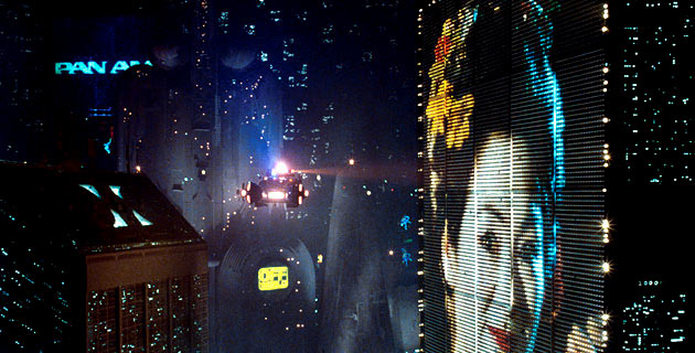
2. Blade Runner – So many films owe their themes and mood to Ridley Scott’s triumphant Blade Runner, itself an adaptation of Philip K. Dick’s “Do Androids Dream of Electric Sheep?” Dick was a masterful writer, and Hollywood has leaned on him time and again for material that makes you question reality while at the same time wondering at what it is exactly that makes us human. The film follows Rick Deckard, a Blade Runner sent to hunt down and ‘retire’ rogue replicants—androids indistinguishable from humans—the most dangerous being a new Nexus 6 model named Roy Batty. So advanced is this new model, however, that it ends up making Deckard, and the viewer, wonder what separates the machine from the man. In his final moments before perishing, Roy Batty gives Deckard the gift of life and appears to show empathy, something which the androids are not supposed to be capable of possessing. It is both a revelation and a curse, despair and catharsis. These questioning of reality and mix of emotions is in keeping with the rest of Dick’s great works. From Minority Report to Total Recall, his penchant for incredible science fiction helped launch the ‘cyberpunk’ genre. What Ridley Scott did with the film version and its many cuts (and I suggest watching them all for a clearer picture), was distill the essence of cyberpunk into a pure visual medium. The film came out while William Gibson was smack in the middle of writing “Neuromancer” and just about had him quit the business. Instead, though, it helped drive him on, so compelling was the sci-fi noir that he had witnessed. Later films such as The Matrix and Ghost in the Shell would have Blade Runner to thank for setting the groundwork for cyberpunk, and authors such as Gibson and Stephenson would find a field of readers that already understood what they were painting with their words. To say I am humbled to write in the same genre would be a tremendous understatement. Blade Runner both inspires and intimidates, but if I have my way, it will serve as a benchmark I can hold my writing up to and be proud of.
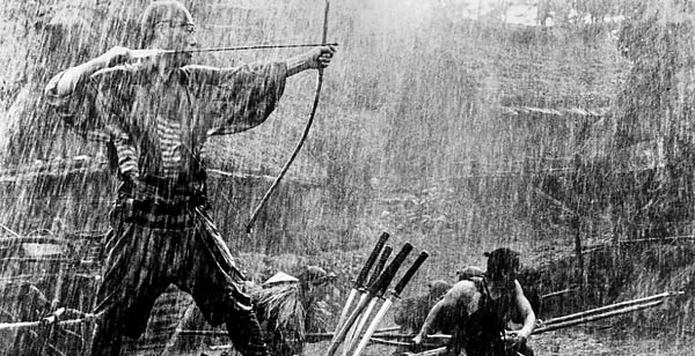
1. The Seven Samurai – What is there to be said about Akira Kurosawa’s masterpiece that hasn’t already been mentioned? The Seven Samurai is more than just a samurai film. It’s more than just a foreign film. Read any list of “Top X Greatest/Best/Most Artistic Y” and The Seven Samurai is guaranteed to be on that list somewhere in the top five, if not the top three. The film transcends every categorization. Calling it a classic would be an insult when it’s just as relatable and relevant today as the day it was first screened. The film is long, the story is simple, there are subtitles, and the cinematography is in black and white. None of that matters. The characters, the direction, the delivery of emotion is so raw, pure, and direct that it’s as if Kurosawa is tapping directly into your brainstem to deliver the perfectly formulated film. To discover that it was Kurosawa’s first samurai film makes the feat all the more impressive. I close my eyes and see snapshots, framed images of artwork, frozen scenes of characters that viewers come to think of as real. Kikuchio backwards on “his” horse. Kambei firing arrows in the rain, each pluck of the bowstring creating a standing wave of water droplets that hover in the air. Kyuzo, the undisputed master swordsman, suddenly struck down by a bullet. The sense of immediacy, the sheer presence of the film is something that fills the room, that infiltrates the senses. Suddenly, simple words become clever dialogue. A simple tale becomes a twisted piece of origami with layers of complications, including a coming of age tale and the challenge of an orphaned peasant child rising to become a samurai, only to be killed by samurai turned bandits. And in the end, the surviving samurai of the original seven realize that their fate, unlike the fate of the farmers they have fought for, is set on a course that can only lead to strife and death. After all the fighting and struggling, the film closes with Kambei explaining to Schichiroji that, “The farmers have won. Not us.” So the samurai move on, unsure of what they have gained, knowing only what they have lost, while behind them the farmers sing and chant as they continue with their happy existence. All these elements, taken together and compressed into a dense layer that passes before one can realize it, is why The Seven Samurai is, in my humble opinion, the greatest film ever to grace the history of cinema.
A.C. Harrison
Like what you see here? Spread the word and support indie authors! Follow me on Facebook or Twitter. Find me on Smashwords and Kindlemojo.
Like what you see here? Spread the word and support indie authors! Follow me on Facebook or Twitter. Find me on Smashwords and Kindlemojo.
 RSS Feed
RSS Feed